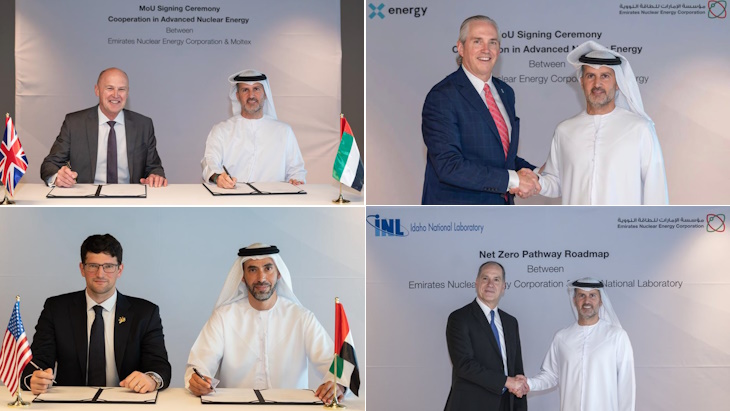
The Emirates Nuclear Energy Corporation (ENEC) has signed memorandums of understanding (MoU) with UK-based advanced nuclear technology developer MoltexFLEX and US-based SMR developers X-energy and Ultra Safe Nuclear Corporation (USNC).
The MoU with MoltexFLEX will see the companies form a joint working group to examine the commercial viability of deploying MoltexFLEX's 60 MWth/24 MWe FLEX molten salt reactor in the UAE and is described by MoltexFLEX as significant step towards bringing the reactor to market. ENEC and MoltexFLEX will assess using FLEX reactors for a range of industrial applications including desalination, hydrogen production and electricity generation.
The FLEX reactor - a thermal neutron (moderated) version of Moltex Energy's stable salt reactor technology - was launched by Moltex Energy subsidiary MoltexFLEX in September 2022.
The MoU between ENEC and X-energy will see the two parties work together to assess technical design and commercial viability of X-energy's nuclear technologies for the UAE market, to meet the growing demand for clean electricity generation, along with generating steam, heat and hydrogen to decarbonise industry. The companies will also evaluate potential project partnerships for developments in the UK and Europe and will develop a regional deployment framework for ENEC-led projects in the Middle East, Africa, and Indian subcontinent, X-energy said.
X-energy is developing the Xe-100 pebble bed high-temperature gas reactor as well as proprietary TRISO-X tri-structural isotropic encapsulated particle fuel. "Our partnership will explore the many ways we can combine X-energy's leading technology with ENEC's delivery expertise to address a broad range of decarbonisation challenges in the region and around the world," said X-energy CEO Clay Sell. "This announcement at COP 28 further demonstrates the incredible global opportunities and demand for nuclear in being a key driver in the expansion of clean, reliable energy."
The MoU signed by ENEC with USNC covers an exploration of commercial development of USNC's Micro-Modular Reactor (MMR) energy systems and paves the way for potential commercialisation of the MMR in the UAE, USNC said. Further areas of collaboration within the UAE include workforce and supply chain development and project delivery, along with a potential framework for ENEC to lead MMR deployments across the region in the Middle East and North Africa (MENA) and other areas covered by the Three Seas Initiative.
The MMR Energy System features the high temperature helium-cooled MMR unit providing up to 45 MWt of heat, delivered into a centralised heat storage unit which can combine the heat from one or more reactors. Electric power or superheated steam can then be extracted from the centralised heat storage unit to meet a wide range of power needs. The heat storage unit combined with the operational flexibility of the MMR provides the means to readily meet and respond hourly to seasonal demand profiles, providing an ideal solution to process heat applications, complement to intermittent renewables, and high-reliability microgrids, according to USNC. USNC has also developed and patented its own TRISO-based, additively manufactured FCM for use in the MMR.
"ENEC stands as a model to the world for project delivery and we are eager to collaborate on the deployment of the MMR Energy System," USNC Founder and CEO Francesco Venneri said.
These latest agreements come days after ENEC launched a programme aimed at leveraging its experience in successfully delivering a nuclear power plant project. The company has already signed MoUs with GE Hitachi Nuclear Energy to explore potential BWRX-300 deployment in the UAE; with with TerraPower, developer of the Natrium sodium fast reactor with a molten salt energy storage system, to explore opportunities for the commercialisation and global deployment of the Natrium technology; and with Westinghouse, to analyse the potential opportunities for technical and commercial deployment of the eVinci microreactor both in the UAE and overseas.
ENEC also announced that it is collaborating with the USA's Idaho National Laboratory to develop a joint roadmap to deliver on net-zero pledges.
"Nuclear energy has had a transformational impact on the UAE's energy landscape," ENEC Managing Director and CEO Mohamed Al Hammadi said: "The clean electricity generated from Barakah is powering high tech industries whilst preventing millions of tons of carbon emissions each year. At COP 28 we are demonstrating the essential value of nuclear and building our network through signing a series of global agreements as part of ENEC ADVANCE Programme."